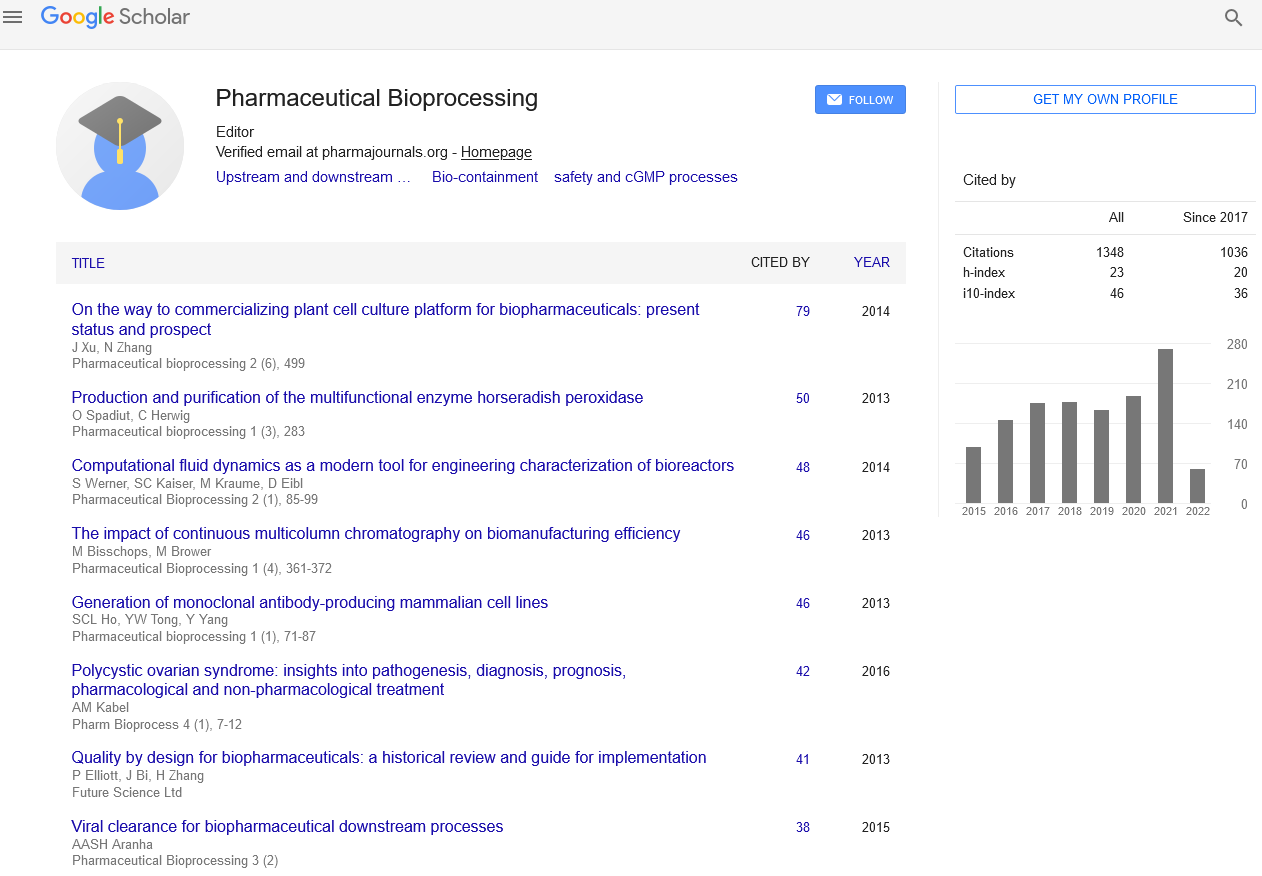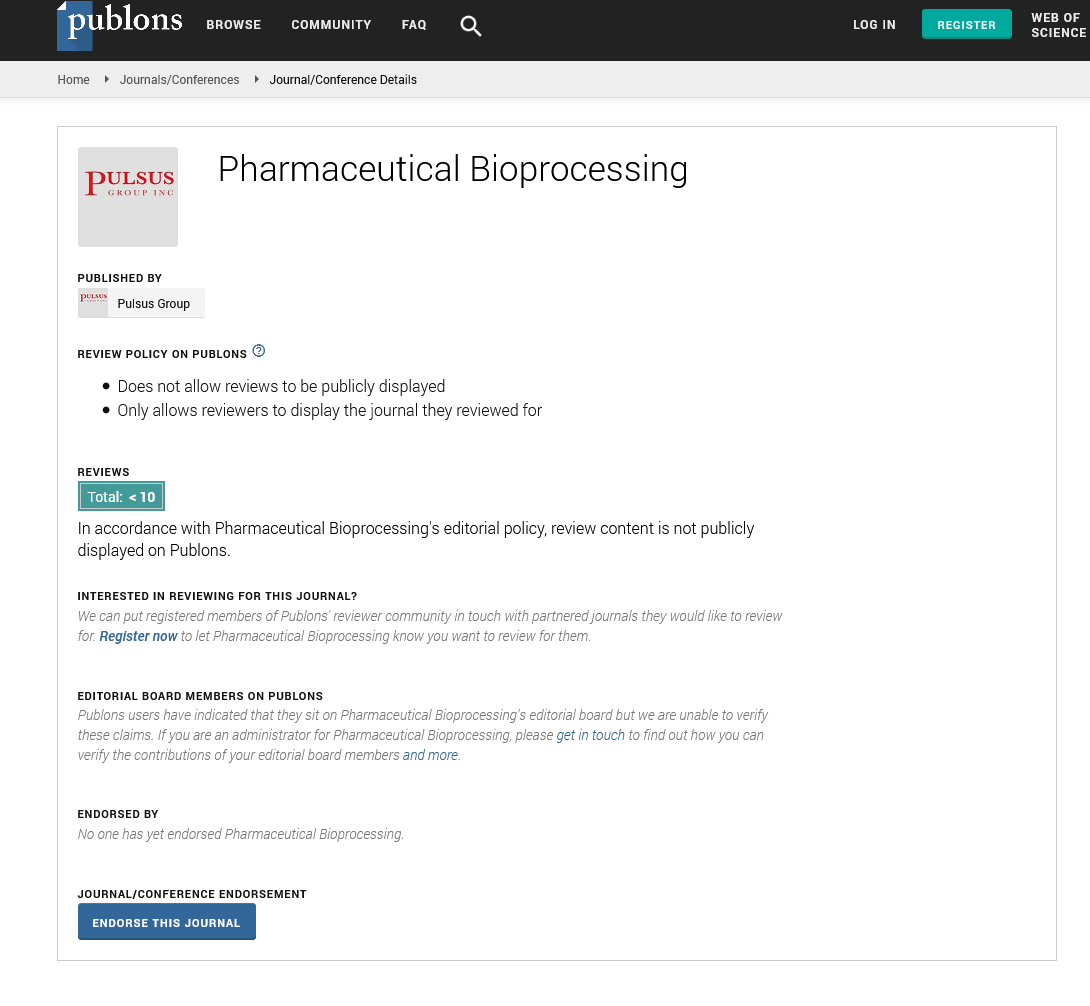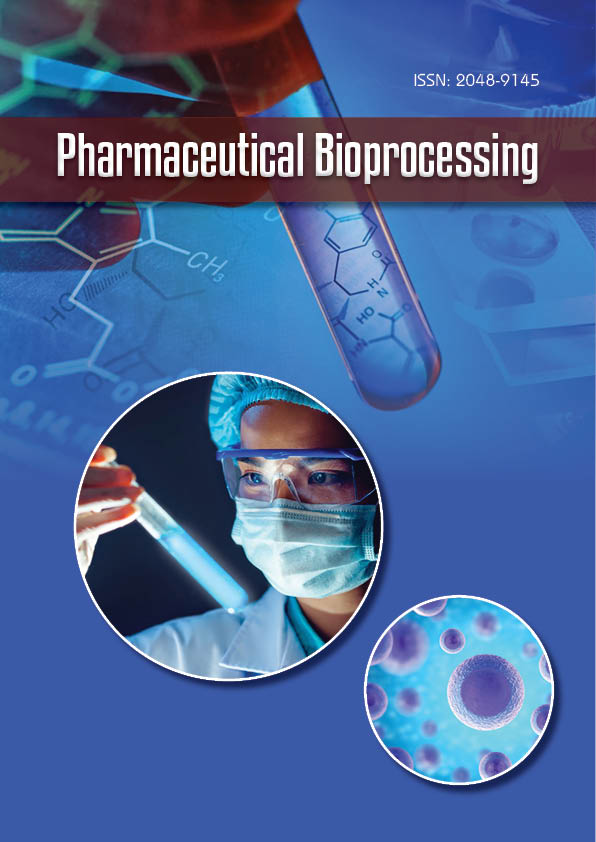Perspective - Pharmaceutical Bioprocessing (2023) Volume 11, Issue 5
Revolutionizing Pharmaceuticals: A Glimpse into the Future of Medicine
- Corresponding Author:
- Andrew S Wells
Department of Medicine,
Astron University,
Birmingham,
United Kingdom
E-mail: charnwodtchnicalconsulting@gmail.com
Received: 15-Sep-2023, Manuscript No. FMPB-23-118611; Editor assigned: 20-Sep-2023, PreQC No. FMPB-23-118611 (PQ); Reviewed: 04-Oct-2023, QC No. FMPB-23-118611; Revised: 19-Oct-2023, Manuscript No. FMPB-23-118611 (R); Published: 27-Oct-2023, DOI: 10.37532/2048-9145.2023.11(5).108-109
Introduction
The field of pharmaceuticals has been on a remarkable journey of evolution and innovation. It is a sector that has consistently pushed the boundaries of science and technology, paving the way for ground breaking discoveries and transformative advancements in medicine. In this we will delve into the exciting world of revolutionizing pharmaceuticals, exploring its significance, the key drivers of change, emerging trends, and the profound impact it is having on the future of healthcare.
Description
The significance of pharmaceuticals
Pharmaceuticals are the bedrock of modern healthcare. They encompass a broad spectrum of medical products, including drugs, biologics, vaccines and medical devices, that play a pivotal role in preventing, diagnosing, and treating diseases. The significance of pharmaceuticals is multifaceted:
Disease management: Pharmaceuticals have revolutionized the management of a wide range of diseases, from chronic conditions like diabetes and hypertension to infectious diseases like HIV and hepatitis. They not only alleviate symptoms but also improve patients’ quality of life and longevity.
Innovation and research: The pharmaceutical industry is a driving force behind scientific research and innovation. It invests heavily in Research and Development (R and D) to discover new treatments, develop cutting-edge therapies, and explore novel approaches to medical challenges.
Economic impact: The pharmaceutical sector is a critical component of the global economy. It generates revenue, creates jobs, fosters innovation and supports a vast network of suppliers, manufacturers, and healthcare professionals.
Public health: Pharmaceuticals contribute significantly to public health by enabling the prevention and control of diseases. Vaccines, for example, have led to the near-eradication of devastating diseases like polio and smallpox.
Drivers of change in pharmaceuticals
Several key drivers are propelling the pharmaceutical industry forward, triggering transformative changes in the landscape of medicine:
Biotechnology and genomics: Advances in biotechnology and genomics have unlocked the secrets of the human genome and the potential for precision medicine. Personalized therapies tailored to an individual’s genetic makeup are becoming a reality.
Artificial intelligence and data analytics: The use of Artificial Intelligence (AI) and data analytics is accelerating drug discovery, clinical trial design and patient care. Machine learning algorithms analyze vast datasets to identify new drug targets and predict patient responses to treatments.
Biopharmaceuticals and gene therapies: Biopharmaceuticals, such as monoclonal antibodies and gene therapies, are at the forefront of innovation. These therapies offer new modalities for treating previously untreatable diseases.
Digital health and telemedicine: The integration of digital health solutions, telemedicine and wearable devices is changing the way healthcare is delivered. Patients can monitor their health, receive remote consultations and access healthcare services with unprecedented convenience.
Regulatory adaptations: Regulatory agencies are evolving to keep pace with scientific advancements. Initiatives like the FDA’s breakthrough therapy designation and accelerated approval pathways are expediting the development and approval of innovative treatments.
Emerging trends in pharmaceuticals
Pharmaceuticals are continuously evolving, giving rise to several prominent trends that are shaping the future of medicine:
Personalized medicine: Tailoring treatments to an individual’s genetic and biological characteristics is a growing trend. This approach maximizes treatment efficacy while minimizing adverse effects.
Biopharmaceuticals: The emergence of biopharmaceuticals, which include monoclonal antibodies, cell therapies, and gene therapies, is expanding treatment options for a wide range of conditions, from cancer to rare genetic diseases.
Digital therapeutics: Digital therapeutics are software-based interventions that treat or manage medical conditions. These solutions are increasingly being integrated into treatment plans, addressing mental health, chronic diseases, and substance use disorders.
The impact on the future of healthcare
The revolution in pharmaceuticals is already having a profound impact on the future of healthcare:
Precision medicine: As personalized medicine becomes more accessible, treatments can be tailored to a patient’s genetic makeup, improving efficacy and reducing the risk of adverse reactions.
Rare disease therapies: The development of orphan drugs and rare disease therapies has transformed the lives of those affected by previously underserved conditions.
Immunotherapies and vaccines: Immunotherapies, particularly in cancer treatment, are offering new hope to patients. Vaccines continue to play a pivotal role in preventing and controlling infectious diseases.
Innovative research: The pursuit of novel therapies, whether in biopharmaceuticals or digital health, is driving innovative research in fields like genomics, bioinformatics and molecular biology.
Economic growth: The pharmaceutical industry is creating jobs and stimulating economic growth. It is a hub for research, development and innovation, attracting top talent from around the world.
Challenges and opportunities
While the future of pharmaceuticals holds immense promise, it is not without its challenges:
Cost and access: The high cost of drug development and manufacturing is a concern, and access to innovative therapies can be limited, especially in lower-income regions.
Regulatory complexities: The stringent regulatory landscape can be a hurdle to bringing innovative treatments to market quickly. Striking a balance between safety and expediency is a continual challenge.
Data security and privacy: The increased reliance on data in pharmaceuticals raises concerns about data security and patient privacy, which require robust safeguards.
Supply chain resilience: The COVID-19 pandemic exposed vulnerabilities in the pharmaceutical supply chain. Ensuring supply chain resilience is a critical concern for the future.
Ethical considerations: Advances like gene editing and digital therapeutics present ethical dilemmas that demand careful consideration.
Conclusion
In conclusion, the pharmaceutical industry is in the midst of a remarkable transformation, revolutionizing the way we approach healthcare. With personalized medicine, biopharmaceuticals, and digital health solutions becoming more integrated into clinical practice, patients are benefiting from more effective and individualized treatments. While challenges persist, the impact of the pharmaceutical revolution on public health, innovation, and the global economy is undeniable. As we navigate the ever-evolving landscape of pharmaceuticals, the future promises to be a world of increasingly tailored, effective, and patient-centric healthcare.


